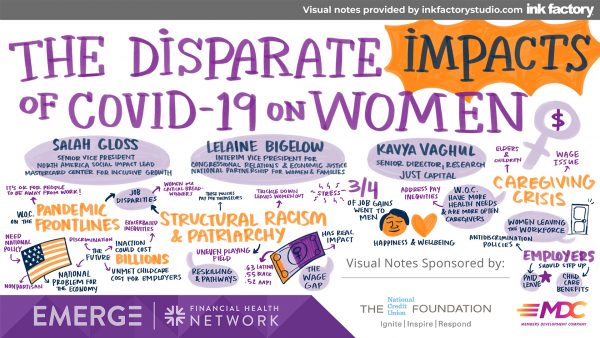To Address the Financial Health Gender Gap, Let’s Fix the Care Economy
New survey data finds lack of affordable, reliable childcare holds women back from working.
Setting a National Financial Inclusion Agenda
Building a truly inclusive financial system that helps people achieve short- and long-term financial stability will require a large-scale coordination of partners to bring about systemic change.
The Financial Health Network Announces Child Tax Credit Research
Challenges continue to impede the distribution of Child Tax Credit payments, especially for those who could benefit from them the most. The Financial Health Network will undertake research, supported by VISA, to determine how long CTC recipients might have waited to receive their payment, how much they might have spent in fees to access their payment, and how they ultimately used their payment.
For ‘unbanked’ Americans, pandemic stimulus checks arrived slowly and with higher fees. But that could change.
When Renee Whittick opened a checking account last year, the smallest financial tasks became easier.
Emergency Savings, Combined with Support Networks, Reduced Hardships During the Pandemic
This research was produced by the Financial Health Network in collaboration with BlackRock’s Emergency Savings Initiative. ESI is a cross-sector program with a mission to help people living on low to moderate incomes gain access to and increase usage of proven savings strategies and tools – ultimately helping them establish an important safety net.
Queer Financial Health: Checking the Pulse During the Pandemic
Our findings showed that LGBTQ+ people in America were less financially healthy, more stressed about their finances, and more likely to have experienced food, housing, and healthcare insecurity when compared to their non-LGBTQ+ peers.
On the Front Lines: How LMI Workers Coped During the COVID-19 Pandemic
Key Finding: Low- to moderate-income (LMI) frontline workers are less likely to be Financially Healthy than non-frontline LMI workers.
Why Nonprime and Prime Customers Need Flexibility Post-Pandemic
As a company focused on serving those consumers who may be shut out of traditional borrowing opportunities, Elevate understands that access to safe, affordable credit is as important as ever in enabling Americans to achieve financial security. Presented by Elevate
The Disparate Impacts of COVID-19 on Women
In this session, a panel of experts will discuss how the cascading economic consequences of the pandemic are reversing years of progress in workplace equity, and may have long-term implications for women’s financial lives for years to come.
Why Financial Health Disparities Continue to Widen
One year into the COVID-19 global pandemic, new data from the U.S. Financial Health Pulse shows that Black and Latinx communities are continuing to disproportionately struggle amidst the ongoing public health crisis, and that financial health disparities appear to be widening by race and ethnicity as a result of the ongoing pandemic.
Improved Financial Wellness Could Be The Silver Lining To The Covid-19 Cloud
Let’s face it: 2020 didn’t give many of us much to celebrate, especially those of us working in human resources and employee engagement. A global health crisis, an economy in freefall and cultural unrest leading to tense racial reckonings — our career cup runneth over, and not in a good way.
It cost Americans more than $66 million to cash their first stimulus checks. Why that could happen again with the $1,400 payments
Almost one year ago, Congress authorized the first $1,200 stimulus checks to help Americans cope with the unprecedented coronavirus pandemic.











